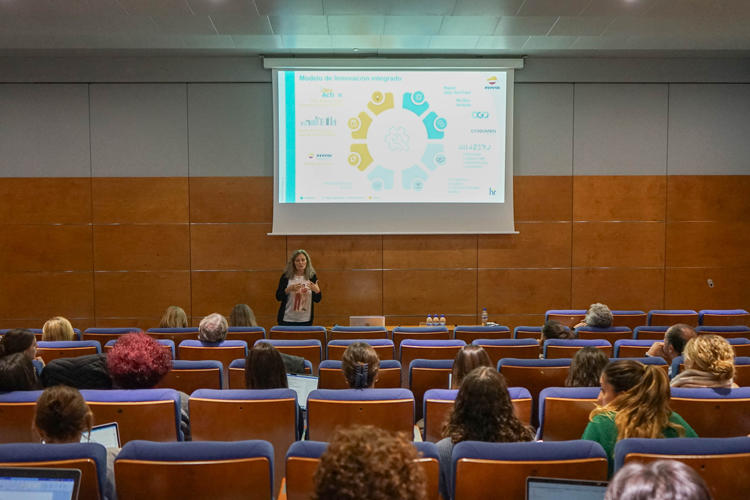On 10 November, IQS hosted the “R&D&i, Competitiveness Factors in Biotechnology” conference, which brought together leading professionals from companies in the sector alongside experts in this field of knowledge.

On 10 November, IQS hosted the "R&D&i, Competitiveness Factors in Biotechnology" conference, organized by the IQS Tech Transfer division. The meeting brought together leading professionals from companies in the sector and experts in the field of Biotechnology, a science that is essential for providing solutions to the problems our society faces in areas as diverse as health, cosmetics, food, fuel, or environmental protection, among many others, not to mention its fundamental role in the development and evolution of various business sectors.
The conference was opened by Dr Salvador Borrós, director of IQS, who highlighted the current explosion of biotechnological areas and the growing interest in developing processes related to them. "Biotechnology is one of IQS's biggest commitments, and we want to promote and achieve vast research capacity in this field," said Dr Borrós. He went on to highlight the need for universities and research centres to have sufficient resources to be able "to train talented and knowledgeable professionals who can innovate and bring that innovation to the market."
The event was structured around five presentations based on different areas of experience, led by both universities and companies. The first presentation was led by Dr Francesc Gòdia, professor of Chemical Engineering and researcher with the Bioengineering and Applied Biocatalysis Group at the UAB and vice president of the European Federation of Biotechnology. Dr Gòdia offered an overview of biotechnology as a "knowledge-based multidisciplinary science" with examples of applications such as mRNA vaccines, gene editing, the directed evolution of enzymes, precision medicine, and many others. He also highlighted other areas where biotechnology has become a key factor, such as the sustainable development that is needed with a continuously growing world population or the significant challenges the chemical industry faces in transforming its production processes. "Without knowledge, there is neither innovation nor transformation," said Dr Gòdia, who also mentioned the need to establish clusters so large companies can bring innovation to the market.
Dr Noemí Serra, R&D director of Medictade Skin Care at LETI Pharma, showed how biotechnology has revolutionized and innovated the world of skin care. Natural products have undergone a great transformation, largely due to the contributions of biotech, producing advanced and personalized products that constitute the future of the world of cosmetics. "After efficacy, naturalness is the second most demanded characteristic by consumers," said Dr Serra, with examples of various products such as peptides, plant stem cells, probiotics, and so on that are currently being used in cosmetic formulations.
Dr Antoni Planas, professor and director of the Biochemistry Laboratory with the IQS Bioengineering Department, presented some examples of the research they conduct within the IQS Biological and Biotechnological Chemistry Group (GQBB) in the areas of biocatalysis and metabolic engineering. "We want to get from the gene to the product in two ways: enzymatic catalysis on the one hand, and cellular factories on the other hand," explained Dr Planas, who presented examples of both ways. In the case of biocatalysis, he spoke about the project to enzymatically obtain HMOs, present in breast milk, to be added as supplements in infant formula, and obtaining partially acetylated chitosan oligosaccharides (paCOS), immune system stimulants with application as nutraceuticals. In the case of metabolic engineering, Dr Planas presented the line of research on obtaining glycolipids as well as the line on obtaining biosurfactants (rhamnolipids) through microalgae.
Representing the company Repsol, Dr M. del Mar González Barroso, Technical Advisor in Biotechnology – Deep Technologies, gave a presentation about the company's integrated innovation model thanks to internal knowledge added to collaboration with universities, R&D centres, startups, and so on. The "Deep Technologies" unit, of which Dr González forms part, is the company's division in which new technologies and scientific approaches are identified for the development of new products from six technological platforms that include areas such as ohmic, microbiological and bioenzymatic processes, and more, all of which have the aim of obtaining low-carbon industrial processes oriented towards the circular economy.
Finally, Dr Pau Vila, CEO of BioSystems, contributed his experience in "going beyond the product" and his path to bringing innovation to the market. For Dr Vila, "innovation consists of five fundamental ingredients: collaboration, knowing the customer's needs, having a purpose and a focus to reach the market, actively listening, and adapting to change." He presented three examples of solutions offered by Biosystems, depending on the needs of their customers: a spectrophotometric analysis platform for the wine sector, the improvement of a fermentation process analysis platform, and an innovative reagent for gluten analysis. All three solutions were brought to market following the recipe highlighted above.
The day closed with a roundtable moderated by Dr Núria Vallmitjana, director of IQS Tech Transfer, who once again stressed the need for collaboration between universities and companies in order to advance and innovate and asked the speakers about "what they expected from companies in collaboration with universities." Concepts such as establishing win-win relationships, streamlining the concept of an expert, getting close to customers, establishing good project management, and conducting targeted research, with an appropriate balance between nurturing knowledge and bringing it to application, were some of the aspects that emerged in the discussion. "When the connection between the members of the research teams at a company and a university is achieved, they function as one and for a long time," said Dr Vallmitjana.










